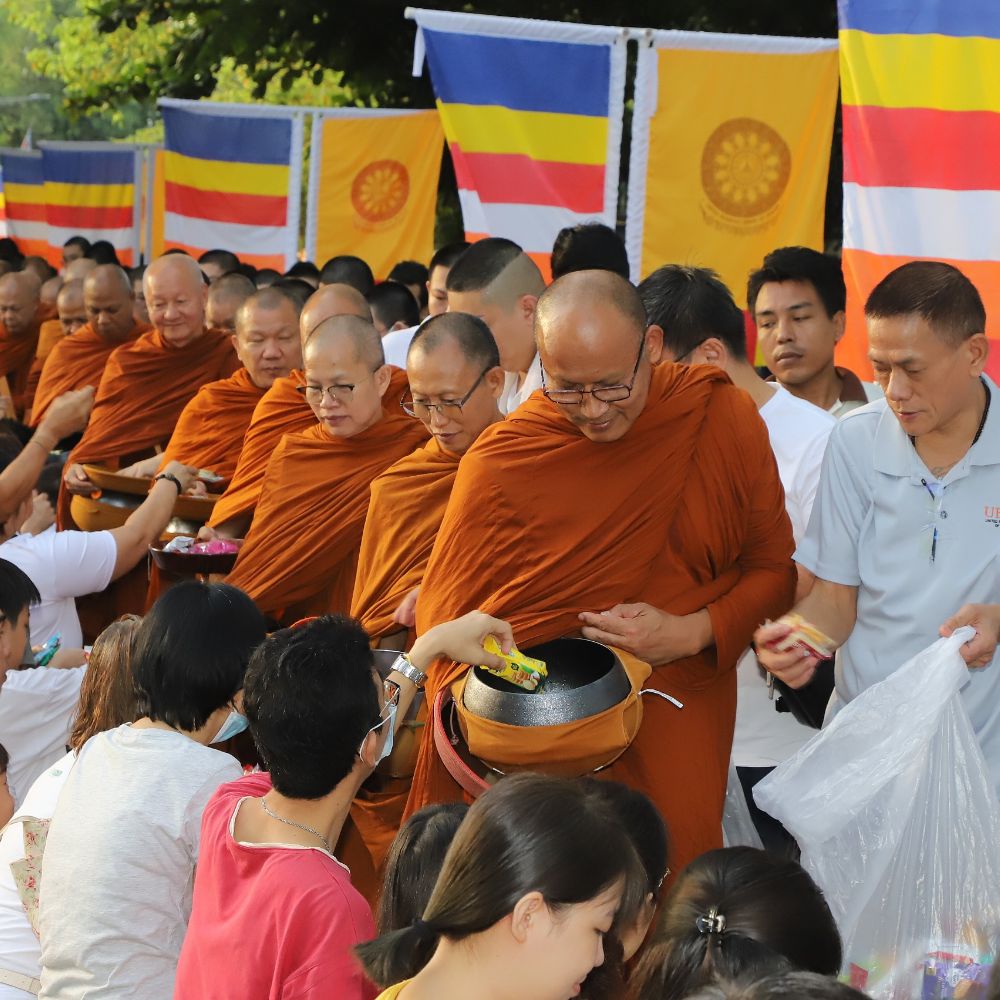Photo Credit: The Star
The Sakyamuni Lord Gautama Buddha attained the state of Samma Sambuddha after immense self-sacrifice over four incalculable aeons and one hundred thousand world cycles. His extraordinary achievement of Enlightenment, was realized through 6 years of relentless effort and great sacrifice at a time when the teaching is not known in the world. This led to the establishment of the Sāsana. It is now our responsibility to safeguard and propagate the Sāsana for future generations.
The Sāsana encompasses all aspects related to the teachings of the Buddha (Dhamma Vinaya), including its study, practical applications through mental cultivation, and propagation. The Pali words are as follows:
We strive to nurture the Sāsana by first cultivating our own minds, allowing the Dhamma to take root and thrive within us, and extending its influence to the broader community. With this vision in mind, UBOM was established on 18th October 2020, as a platform to spread the Dhamma Vinaya in Malaysia and abroad.

In line with our motto, “Together We Care for the Sāsana. Together Big Tasks are Made Easy”, UBOM is steadfast in fostering collaboration and encouraging teamwork for the growth of the Sāsana.
UBOM endeavors to inspire and support the growth of Buddhism in Malaysia and globally. We aim to serve the Buddhist communities by encouraging collaboration and facilitating the sharing of resources, skills, and knowledge.
At UBOM, we embrace the spirit of good spiritual friendship (Kalyāṇa-mitta) by fostering an environment of compassion and collaboration.
At UBOM, we embrace the spirit of good spiritual friendship (kalyana mitta) by fostering an environment of compassion and collaboration. We aspire to provide unconditional support to enable each other to succeed in their dhamma propagation by instilling these values as our guiding principles:
The United Buddhist Order of Malaysia (UBOM) is a non-profit organization which was founded and guided by the Thai Forest Tradition, a lineage of Theravada Buddhism.
UBOM is dedicated to supporting all Buddhist organizations in the propagation of Dhamma Vinaya. We believe that a collective effort in disseminating Dhamma Vinaya will ensure the flourishing of the Sāsana and provide greater opportunities for the Buddhist community to comprehend and practice the well-expounded Dhamma, ultimately leading to liberation from Samsara.
UBOM is committed to fostering collaboration and the exchange of knowledge, skills, and resources in Dhamma Vinaya propagation activities. Our events extend beyond monastery compounds to bring together Buddhists from diverse background and traditions to cultivate volunteerism and instill a strong sense of community spirit.
Additionally, recognising the critical importance of maintaining the well-being of learned monastics for the future of Buddhism, UBOM is devoted to mobilising resources to offer services and medical assistance to monastics registered with UBOM for their missionary work in Malaysia. Learn more about Our Services.
We welcome Buddhist monasteries and societies of all traditions, like-minded organisations to join us as Brother Monasteries and individuals to join our Membership to establish an international network to promote and foster fellowship in the Dhamma.
You can join as a member, attend our events, or share our mission with others.
We promote collaborations through the sharing of resources such as knowledge, talent, expertise, information, and tangible resources. Our events extend beyond monastery compounds to bring together Buddhists from diverse backgrounds and traditions.
Join UBOM today and be part of a collective effort to preserve and promote Buddhism in Malaysia and beyond. Together, we can achieve greater success in spreading the teachings of Dhamma-Vinaya, ensuring the continued growth and prosperity of the Buddhist community.
82 Jalan Tasek Mutiara 6, Pusat Komersial Bandar Tasek Mutiara, Persiaran Mutiara 1 14120 Simpang Ampat Pulau Pinang
Copyright 2024 United Buddhist Order Of Malaysia | Powered by Androgeus

Inspired by the Buddha’s exposition in “Saraniya Sutta – Conducive to Amiability”; and the “Bhikkhu-aparihaniya Sutta – Conditions for No Decline Among the Monks”, UBOM was founded on 18 Oct 2020, with a noble dream – that one day all Buddhist organizations can come together to help one another in propagating the Dhamma-Vinaya, in line with the belief that if everyone is successful in the propagation of Dhamma-Vinaya, the Sasana shall thrive.
To see everyone succeed in their dhamma propagation is itself a rewarding experience and motivation for UBOM to continue its mission in line with its motto, “Together we care for the Sasana, Together big tasks are made easy.” We draw our inspiration from your success and happiness, to be steadfast in caring for the Sasana.
Taking the cue from Saraniya Sutta on conditions that are conducive to amiability, UBOM is committed to conduct itself in ways that engender mutual feelings of fellowship, respect, harmony and unity within the Buddhist community and beyond in its effort to propagate the Dhamma far and wide. A key aspect for the Sasana to prosper and flourish lies in the Sangha, which plays an important role in connecting the lay community to the Dhamma. In this regard, UBOM endeavours to uphold the principles as laid down by the Buddha in the Bhikkhu-aparihaniya Sutta on conditions that lead to the long-term welfare and growth of the Sangha.
With this dream in mind, UBOM began to develop action plans and its blueprint. With the subsequent execution of these plans, UBOM will continue to evolve and fine-tune its strategies to be more effective and efficient in pursuit of its dream. We aspire to serve the Buddhist communities in Malaysia and abroad, by encouraging collaboration and facilitating the sharing of resources, skills and knowledge to help each other succeed in Dhamma propagation work and activities, for the well-being and spiritual progress of all.
At UBOM, we embrace the spirit of good spiritual friendship (kalyāṇa-mitta) by sincerely offering our support and contributions without expecting anything in return. We aspire not to compete, but to support and complement others in ways that would help them succeed in imparting the Dhamma.
The following values are the guiding principles for all that we do:
1) To care without wanting to control
2) To share without any expectation
3) To support without being competitive
Amicably and respectfully, united by our fellowship in the Dhamma, we care and we share, in harmony within our community and other like-minded groups, towards a thriving Sāsana.
UBOM is not intended as a governing body, nor to enforce, represent or make decision on behalf of anyone. We embrace the fact that everyone is unique and we shall derive our strength from this uniqueness to turn our dream into reality.
“Monks, these six are conditions that are conducive to amiability, that engender feelings of endearment, engender feelings of respect, leading to a sense of fellowship, a lack of disputes, harmony, & a state of unity. Which six?
“There is the case where a monk is set on bodily acts of goodwill with regard to his companions in the holy life, to their faces & behind their backs. This is a condition that is conducive to amiability, that engenders feelings of endearment, engenders feelings of respect, leading to a sense of fellowship, a lack of disputes, harmony, & a state of unity.
“And further, the monk is set on verbal acts of goodwill with regard to his companions in the holy life, to their faces & behind their backs. This, too, is a condition that is conducive to amiability, that engenders feelings of endearment, engenders feelings of respect, leading to a sense of fellowship, a lack of disputes, harmony, & a state of unity.
“And further, the monk is set on mental acts of goodwill with regard to his companions in the holy life, to their faces & behind their backs. This, too, is a condition that is conducive to amiability, that engenders feelings of endearment, engenders feelings of respect, leading to a sense of fellowship, a lack of disputes, harmony, & a state of unity.
“And further, whatever righteous gains the monk may obtain in a righteous way—even if only the alms in his bowl—he does not consume them alone. He consumes them after sharing them in common with his virtuous companions in the holy life. This, too, is a condition that is conducive to amiability, that engenders feelings of endearment, engenders feelings of respect, leading to a sense of fellowship, a lack of disputes, harmony, & a state of unity.
“And further—with reference to the virtues that are untorn, unbroken, unspotted, unsplattered, liberating, praised by the observant, ungrasped at, leading to concentration—the monk dwells with his virtue in tune with that of his companions in the holy life, to their faces & behind their backs. This,
too, is a condition that is conducive to amiability, that engenders feelings of endearment, engenders feelings of respect, leading to a sense of fellowship, a lack of disputes, harmony, & a state of unity.
“And further—with reference to the view that is noble, leading outward, that leads those who act in accordance with it to the right ending of suffering & stress—the monk dwells with his view in tune with that of his companions in the holy life, to their faces & behind their backs. This, too, is a condition that is conducive to amiability, that engenders feelings of endearment, engenders feelings of respect, leading to a sense of fellowship, a lack of disputes, harmony, & a state of unity.
“These are the six conditions that are conducive to amiability, that engender feelings of endearment, engender feelings of respect, leading to a sense of fellowship, a lack of disputes, harmony, & a state of unity.”
I have heard that on one occasion the Blessed One was staying near Rājagaha on Vulture Peak Mountain. There he addressed the monks: “Monks, I will teach you the seven conditions that lead to no decline. Listen & pay close attention. I will speak.”
“As you say, lord,” the monks responded to the Blessed One.
The Blessed One said: “And which seven are the conditions that
lead to no decline?
[1] “As long as the monks meet often, meet a great deal, their growth can be expected, not their decline.
[2] “As long as the monks meet in harmony, adjourn from their meetings in harmony, and conduct Saṅgha business in harmony, their growth can be expected, not their decline.
[3] “As long as the monks neither decree what has been undecreed nor repeal what has been decreed, but practice undertaking the training rules as they have been decreed, their growth can be expected, not their decline.
[4] “As long as the monks honor, respect, venerate, and do homage to the elder monks—those with seniority who have long been ordained, the fathers of the Saṅgha, leaders of the Saṅgha— regarding them as worth listening to, their growth can be expected, not their decline.
[5] “As long as the monks do not submit to the power of any arisen craving that leads to further becoming, their growth can be expected, not their decline.
[6] “As long as the monks see their own benefit in wilderness dwellings, their growth can be expected, not their decline.
[7] “As long as the monks each keep firmly in mind: ‘If there are any well-behaved companions in the holy life who have yet to come, may they come; and may the well-behaved companions in the holy life who have come live in comfort,’ their growth can be expected, not their decline. “As long as the monks remain steadfast in these seven conditions, and as long as these seven conditions endure among the monks, the monks’ growth can be expected, not their decline.”